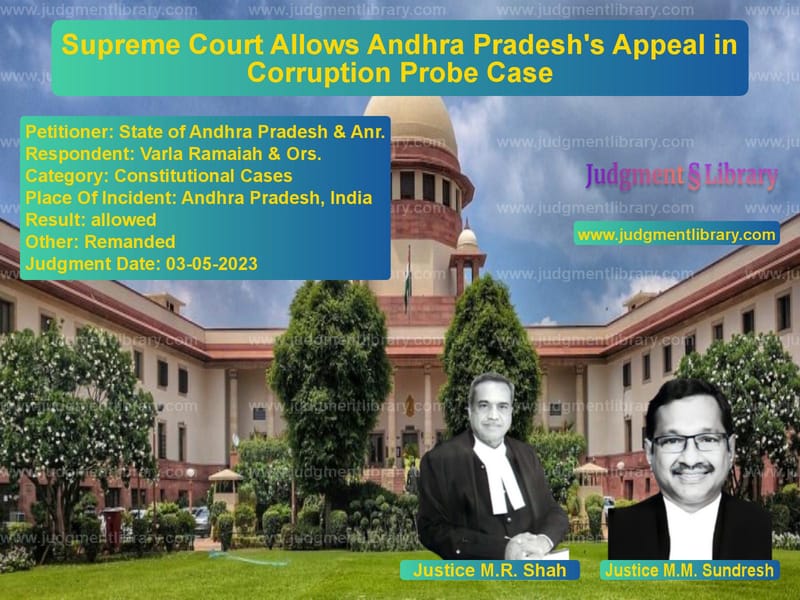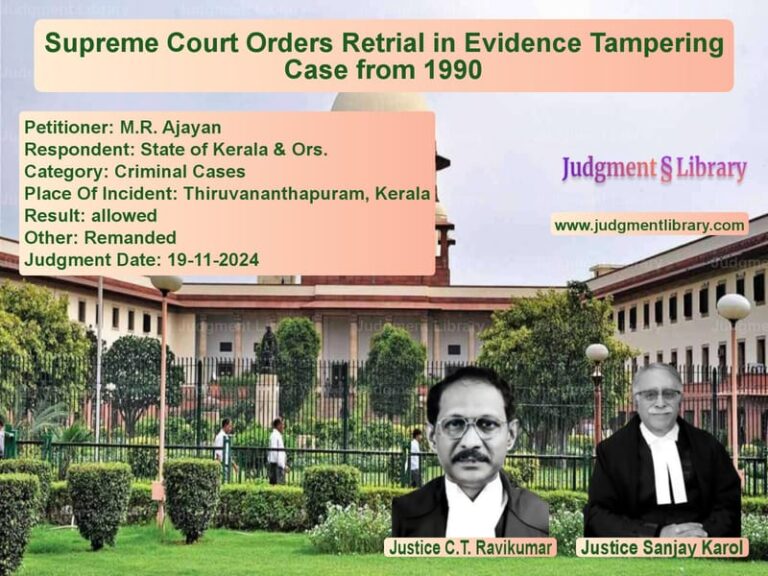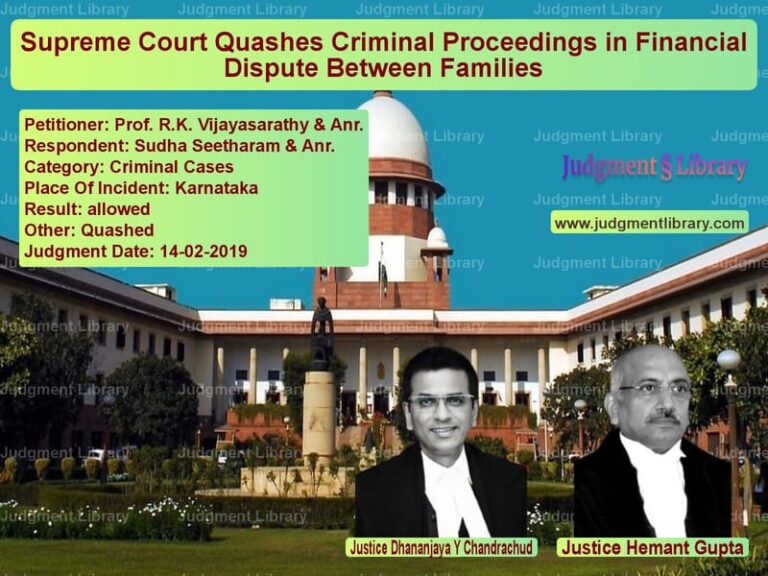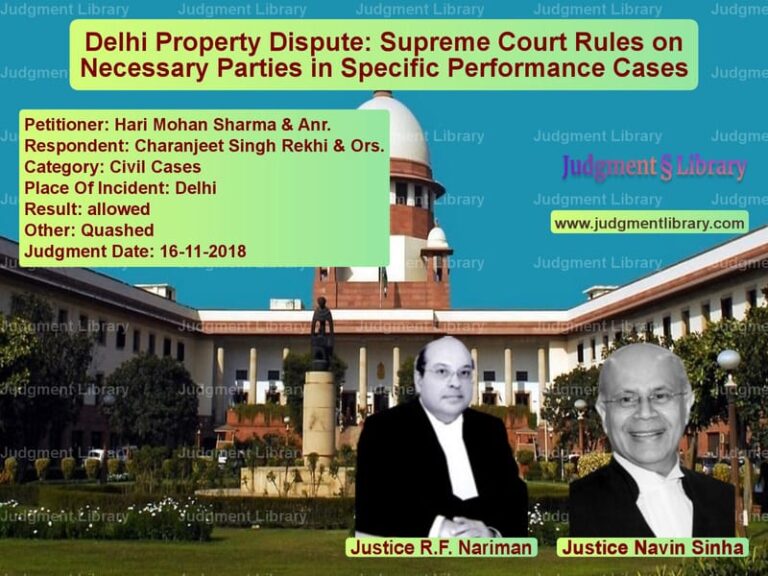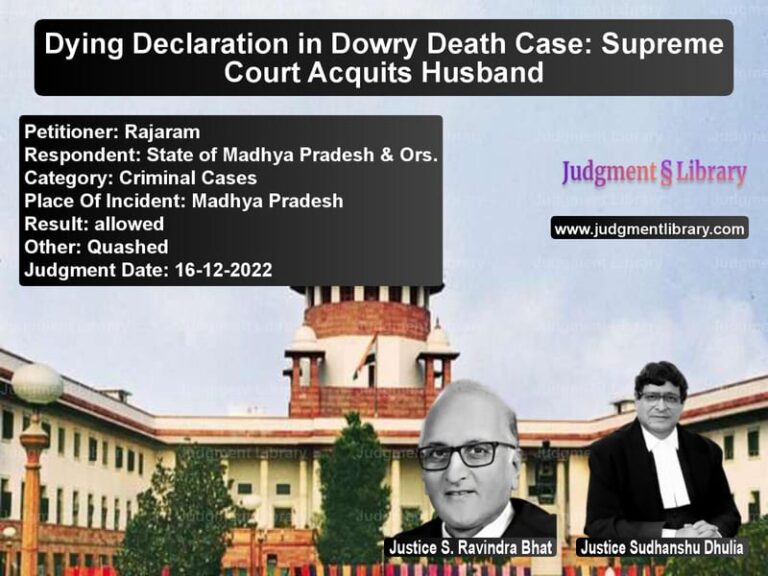Supreme Court Allows Andhra Pradesh’s Appeal in Corruption Probe Case
The Supreme Court of India recently ruled in favor of the State of Andhra Pradesh, overturning an interim stay imposed by the Andhra Pradesh High Court on an investigation into corruption allegations against the previous government. The case, involving the formation of a Special Investigation Team (SIT) to probe alleged misappropriations, highlights key issues regarding executive power, judicial review, and government accountability.
Background of the Case
The dispute arose when the State Government of Andhra Pradesh issued two Government Orders (G.O.s) – one on June 26, 2019, appointing a Cabinet Sub-Committee to examine allegations of corruption against the previous government, and another on February 21, 2020, setting up a Special Investigation Team (SIT) for a detailed probe.
The Sub-Committee’s report, submitted on December 27, 2019, found prima facie evidence of corruption and recommended further investigation. The State Government then requested the Central Bureau of Investigation (CBI) to take over the case.
However, the High Court of Andhra Pradesh, while admitting writ petitions filed by the respondents, stayed all further proceedings related to these G.O.s, effectively stalling the investigation. The State Government appealed this order before the Supreme Court.
Arguments Presented
Petitioner’s (State of Andhra Pradesh) Arguments
The counsel representing the State argued:
- The High Court erred in assuming that a new government cannot investigate alleged corruption by a previous administration.
- The decision to constitute the Sub-Committee and SIT was an exercise of executive power aimed at uncovering corruption and was not an arbitrary action.
- The High Court wrongly interpreted the government’s actions as a ‘review’ of previous policies, whereas it was merely an investigation into potential misconduct.
- There was no mala fide intent in the investigation, as the State had even sought CBI involvement to ensure transparency.
Respondents’ Arguments
The respondents, led by senior counsel, countered:
- The government’s decision was politically motivated and aimed at targeting opposition leaders.
- The State could not overturn decisions made by the previous government, as governance must have continuity.
- The composition of the SIT and the manner in which the probe was initiated raised concerns about fairness and impartiality.
- The High Court was correct in issuing the stay, as the matter involved sensitive political considerations.
Supreme Court’s Judgment
After reviewing the case, the Supreme Court ruled in favor of the State of Andhra Pradesh, overturning the High Court’s stay order. The key observations included:
- “The High Court has misinterpreted the objective behind the formation of the SIT, which was to investigate corruption and not to review past policies.”
- “The decision to investigate allegations of corruption does not amount to reversing the policies of the previous government.”
- “An inquiry into alleged acts of corruption and misfeasance must not be stalled without substantive legal grounds.”
- “A new government is within its rights to investigate past misconduct, provided due process is followed.”
Implications of the Judgment
This ruling is significant in reinforcing the power of state governments to investigate past administrations without undue judicial interference. The key takeaways include:
- Judicial Restraint in Executive Matters: The judgment underscores that courts should be cautious while intervening in executive decisions related to corruption investigations.
- Continuity vs. Accountability: While governance requires continuity, accountability for corruption is equally important, and newly elected governments have the right to investigate past misdeeds.
- Legitimacy of SITs and Sub-Committees: The ruling validates the role of SITs in investigating corruption cases and affirms the executive’s authority to constitute them.
Conclusion
The Supreme Court’s decision in this case upholds the principles of accountability and transparency in governance. By allowing the investigation to proceed, the Court has reinforced the need for due diligence in public administration while ensuring that judicial intervention does not unduly hinder legitimate inquiries.
This ruling will serve as a reference point for future cases involving corruption investigations against previous governments, balancing the imperatives of political continuity with the necessity of legal scrutiny.
Petitioner Name: State of Andhra Pradesh & Anr..Respondent Name: Varla Ramaiah & Ors..Judgment By: Justice M.R. Shah, Justice M.M. Sundresh.Place Of Incident: Andhra Pradesh, India.Judgment Date: 03-05-2023.
Don’t miss out on the full details! Download the complete judgment in PDF format below and gain valuable insights instantly!
Download Judgment: state-of-andhra-prad-vs-varla-ramaiah-&-ors.-supreme-court-of-india-judgment-dated-03-05-2023.pdf
Directly Download Judgment: Directly download this Judgment
See all petitions in Public Interest Litigation
See all petitions in Separation of Powers
See all petitions in Legislative Powers
See all petitions in Fundamental Rights
See all petitions in Other Cases
See all petitions in Judgment by Mukeshkumar Rasikbhai Shah
See all petitions in Judgment by M.M. Sundresh
See all petitions in allowed
See all petitions in Remanded
See all petitions in supreme court of India judgments May 2023
See all petitions in 2023 judgments
See all posts in Constitutional Cases Category
See all allowed petitions in Constitutional Cases Category
See all Dismissed petitions in Constitutional Cases Category
See all partially allowed petitions in Constitutional Cases Category

